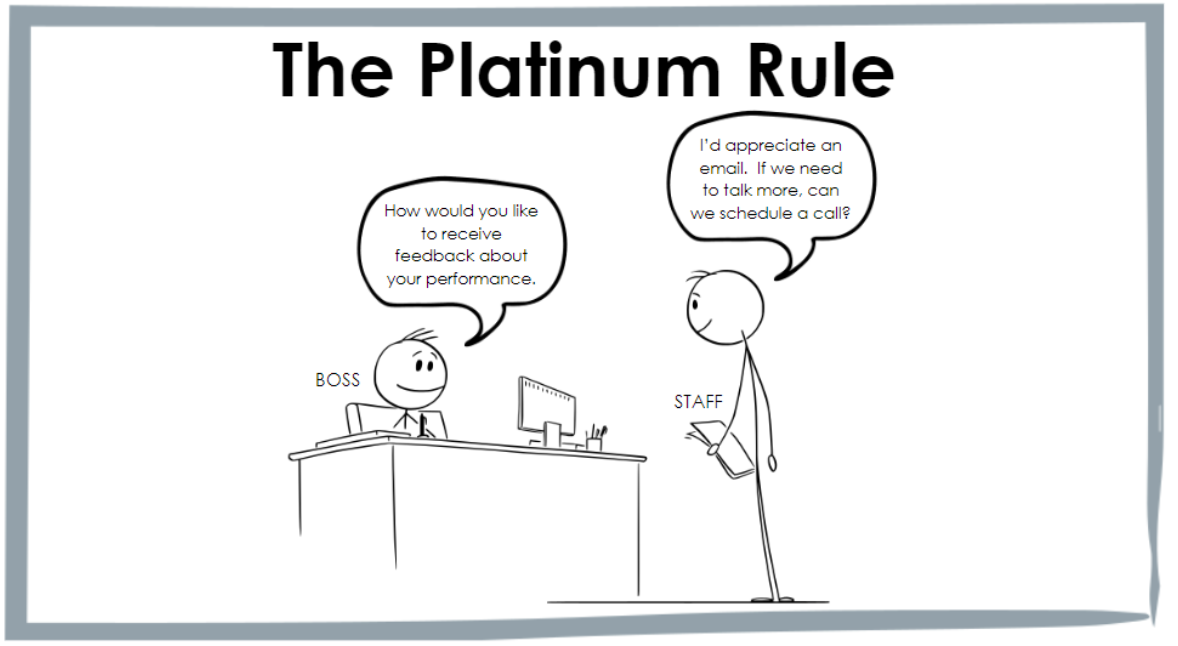What’s Better than the Golden Rule?
Did you learn the famous Golden Rule growing up? “You should treat others as you want to be treated.”
The sentiment is nice. The intent is good – treat others well. It works just fine if everyone agrees on what being “treated well” means. But it doesn’t consider individual preferences, differences, and lived experiences. The focus is on me – what do I think, want, and believe to be respectful?
Instead, try using the Platinum Rule – “treat others as they would like to be treated.” While the two rules are very similar, there is an important subtle difference. Treat others as they want to be treated. The emphasis is on understanding and respecting differences in preferences, needs, and communication styles of others.
Let’s look at an example comparing the Golden Rule and the Platinum Rule in action in the office:
Golden Rule: I like to receive feedback from my boss verbally in a one-on-one, in-person meeting.
In this situation, if the boss applies the Golden Rule, they may cause their employee to be stressed out which means the employee may not be able to do their best work or receive the necessary feedback.
Platinum Rule: I want to give my employee feedback in a way that they will use it, therefore I will ask them how they want to receive feedback.
In this situation, the boss is taking the time to find out what works best for their employee – figuring out how they want to be treated. It is much more likely that the employee will be able to receive and use the feedback since they are getting it how they best receive it.
Here are some other examples of how to use the Platinum Rule in the workplace:
Communication Style – figure out how someone likes to be communicated with.
Do they prefer something written or a conversation?
Do in-person meetings make them uncomfortable? If there must be an in-person meeting, maybe there is something you can do to make it a better experience.
Recognition – some people prefer to be publicly praised, while others would appreciate something more discreate. Use whatever form of recognition that is most meaningful to the person you want to praise.
Collaboration – allow your team members to choose how to communicate for collaboration sessions. Some people love a group brainstorming session, while others get anxiety from them.
Here are some tips for using the Platinum Rule in your workplace:
Communicate Preferences
We want to foster an environment where everyone feels empowered to speak up.
Share your own preferences. Being the first person to speak up can be terrifying, but someone must start the conversation.
Create a space for your team to communicate how they want to be treated.
Be Open to Feedback – Especially When it Triggers Guilt or Discomfort
We’ve all been in a situation where someone says something meant to be a joke and someone else points out how offensive the comment is. What do you do?
Avoid a knee-jerk reaction to diminish the person’s feelings. The person who pointed out that the comment was offensive is communicating how they wish to be treated, you just happened to make a mistake.
Take the opportunity for your empathy to grow. If you don’t understand why they see it as offensive, engage in a conversation so you can understand their point of view. Then apologize and keep their thoughts in your mind for future interactions.
Clearly Communicate Your Boundaries
Boundaries can be hard to set both in the workplace and in personal relationships, but they are essential.
Speak up in a thoughtful manner when one of your boundaries is crossed so the person who crossed it can know in the future what not to do.
Never Stop Asking Questions
There’s always room for improvement, including in the way we interact with each other.
We can all be more sensitive to each other, more understanding, and open to growth.
Takeaway
The Platinum Rule requires you to know how the people around you want to be treated. It removes the assumption that everyone wants to be treated the same way. We can meet the needs of others when we take the time to understand and respect their unique preferences. The Platinum Rule helps foster better relationships and collaboration.
Resources:
Article written by Mel Luckenbaugh




